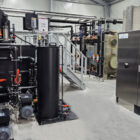A piston pump is a positive displacement pump that pumps liquids through the movement of a piston. It uses the linear movement of the piston to cyclically change the volume of a pump chamber, whereby liquids are sucked in and expelled again. Piston pumps are known for their ability to generate high pressures and are widely used in water and wastewater technology.
Structure and components
Piston
The piston is the central element of the pump, which is moved by a mechanical force to enable the pumping process.Pump chamber
The chamber is the housing in which the fluid is absorbed and expelled. It is equipped with inlet and outlet valves.Valves
These ensure that the fluid flows in one direction: The inlet valve opens during the intake stroke and the outlet valve opens during the delivery stroke.Drive
The drive can be mechanical or electrical, depending on the application. In industrial applications, piston pumps are often equipped with an electric motor.
Functionality
Piston pumps work in two phases:
Suction stroke
During the backward movement of the piston, a vacuum is created in the pump chamber. This opens the inlet valve and the liquid is sucked into the chamber.Delivery stroke
The liquid is compressed during the forward movement of the piston. The inlet valve closes and the outlet valve opens, causing the liquid to be expelled under high pressure.
Technical specifications
- Flow rate: Dependent on piston diameter, stroke and frequency.
- Pressure range: Up to several hundred bar.
- Conveying medium: Suitable for water, chemicals, oils or sludge.
Advantages
- High pressure: Piston pumps can generate very high pressures, making them ideal for applications such as reverse osmosis or high-pressure cleaning.
- High accuracy: They are particularly precise when dosing liquids.
- Robustness: Due to their simple but stable design, they can also work under extreme conditions.
Applications in industrial water technology
Waste water treatment
They are used for conveying and dosing chemicals in precipitation and neutralization processes.Water treatment
Piston pumps play a central role in reverse osmosis systems by forcing the raw water through the membranes under high pressure.Industrial processes
In the chemical industry, they are used to transport aggressive liquids such as acids or alkalis.
Maintenance and servicing
Piston pumps are relatively high-maintenance, as they consist of moving parts that need to be checked and lubricated regularly. Critical components such as seals and valves are subject to wear and should be inspected regularly and replaced if necessary.
- Seal replacement: Prevents leaks and pressure losses.
- Valve cleaning: Necessary to prevent blockages caused by deposits.
Conclusion
Piston pumps are an indispensable component in industrial water and wastewater treatment. Their versatility, high pressure capability and precision make them a preferred choice in numerous applications. With the right maintenance, piston pumps offer a long service life and reliable operation.








